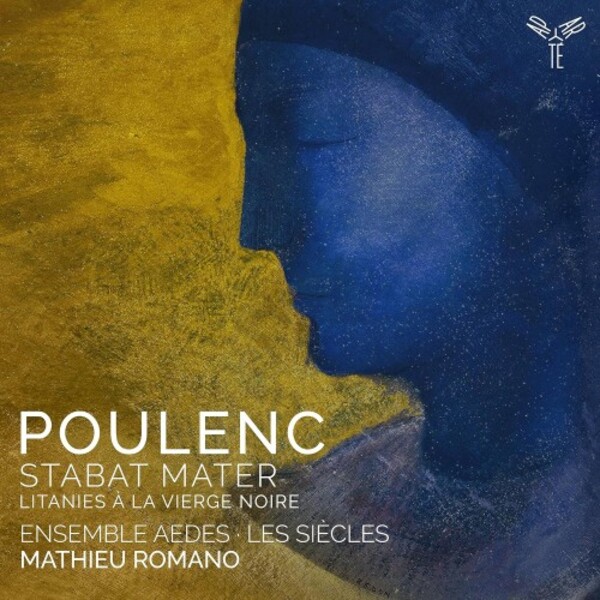POULENC Stabat Mater (Romano)
View record and artist detailsRecord and Artist Details
Genre:
Vocal
Label: Aparte
Magazine Review Date: 01/2024
Media Format: CD or Download
Media Runtime: 41
Mastering:
DDD
Catalogue Number: AP323

Tracks:
| Composition | Artist Credit |
|---|---|
| Litanies à la vierge noire |
Francis Poulenc, Composer
Ensemble Aedes Louis-Noël Bestion de Camboulas, Organ Mathieu Romano, Conductor |
| O doulx regard, o parler |
Clément Janequin, Composer
Ensemble Aedes Mathieu Romano, Conductor |
| Stabat mater |
Francis Poulenc, Composer
Ensemble Aedes Marianne Croux, Soprano Mathieu Romano, Conductor |
Author: Alexandra Coghlan
Founded in 2005, Mathieu Romano’s 17-strong Ensemble Aedes are vocal shapeshifters, slipping seamlessly from opera chorus to chamber choir. French repertoire is as close as they come to a specialism, and this all-Poulenc programme continues their journey through his music, with a starry guest turn from regular collaborators Les Siècles.
We’re on sacred ground this time. We meet Poulenc at his most privately, intimately prayerful – in his earliest sacred work, the Litanies à la Vierge Noire – and at his most theatrical in the Stabat mater with its pre-echoes of Dialogues des Carmélites. Romano exacerbates the contrast, opting for the original scoring of the Litanies for three-part women’s chorus and organ rather than the later orchestration. Recorded at Royaumont Abbey, the Cavaillé-Coll organ (played by Louis-Noël Bestion de Camboulas) sets the tone with the muted, bell-like glow of the introduction.
Chasing the composer’s instruction rudimentairement, Romano draws an appealing directness from his singers, tone not handled too much, nothing unduly finessed, but beautifully organic and glassy: we hear everything we should. Balancing the directness is a sense of distance, as if we’re hearing the music from outside a cloister or grille. The effect is mesmerising, less brilliant than The Sixteen (Coro, 4/17) but charged with greater intensity.
The Stabat mater, supported by the period instruments of Les Siècles, is boldly idiomatic – the woody nasality of the woodwind a mirror to the choir’s covered vowels and tone. Choral parts float as a set of equally balanced voices, catching the work’s mercurial moods as they pass without ever giving the listener a chance to find a secure foothold. ‘Quae moerebat’ and ‘Eja mater’ dance and gleam – fresh, too-bright visions that try (and fail) to blot out the accusations of the ‘Quis est homo’, which makes the pain personal, flung out in shrieks and snarls from voices and instruments. Soloist Marianne Croux slips deftly in and out of the texture – not an other-worldly angel but a voice in the crowd.
Romano keeps the text always at the fore, hugging its shifts of perspective as the narrator directs our gaze first outwards to the Virgin and then to himself. Third and first person sound different here: a distinction that brings out the planes and depth of the drama. It’s a striking and skilled pair of performances, with Janequin’s O doulx regard a radiant palate-cleanser between.
Discover the world's largest classical music catalogue with Presto Music.

Gramophone Digital Club
- Digital Edition
- Digital Archive
- Reviews Database
- Full website access
From £8.75 / month
Subscribe
Gramophone Full Club
- Print Edition
- Digital Edition
- Digital Archive
- Reviews Database
- Full website access
From £11.00 / month
Subscribe
If you are a library, university or other organisation that would be interested in an institutional subscription to Gramophone please click here for further information.




